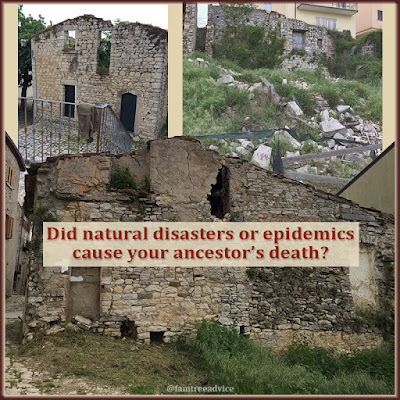If a lot of townspeople died at the same time, something big happened.
When we research our relatives from centuries past, we find lots of tragedies. Mothers who die in childbirth. Babies born shortly after their father died. Two or 3 siblings dying within hours of one another. Stillborn babies.
If you find family members dying at about the same time, that may point to an historical event.
Did something happen to cause many people to die? An epidemic? A natural disaster?
The 1805 Earthquake
Many years ago an historian from my grandfather's hometown gave me a piece of history. It's a list of 40 townspeople who died in the earthquake of 26 July 1805. To put this in context, that's the same year Napoleon declared himself the Italian Emperor.
The info in the list is as good as an Italian death record. It includes:
- the deceased's name and age
- their parents names
- their spouse's name if they had one.
One by one, I'm checking the victims' names against my family tree. On line 23 I find someone. Everything I knew about Maria I learned from her son Giovanni's 1829 death record. I knew her husband died in 1805, but it wasn't clear if Maria was alive at that time.
 |
| What can history's tragedies tell you about your ancestor's death? |
Now, thanks to this list of earthquake victims in 1805, I've got more facts:
- She was born in 1749. By coincidence, that was the estimated birth year I was using already. I have a rule I follow. If I don't know when someone was born, I subtract 25 from their oldest child's birth year. I had Maria's birth year as "about 1749" because I know her son Giovanni was born in 1774.
- Her parents were Mattia Pizzella and Libera Polcino. I can estimate that they were born "about 1724".
- Her husband was Giorgio Pozzuto. That's a key fact. That and her age helped me match this earthquake victim to the woman already in my family tree.
- Her approximate date of death. My list of victims doesn't say whether these 40 people died immediately. In Family Tree Maker, I'll give them a death date of "about 26 Jul 1805". I'll add "Victim of the 26 July 1805 earthquake" as the description. My source for these facts is my friend the historian. He has given me lots of facts over the years. He has access to the original documents.
Three of the victims were my 6th great aunt Libera and her 2 little girls Grazia and Anna Maria. Libera's husband Giovanni Palmiero must have remarried after their deaths. Can you imagine his sorrow, having his family wiped out? There is another Giovanni Palmiero in my family tree. He's about the right age and married a younger woman. This could be him, but without church records for his marriage, I can't be sure.
 |
| A list of the victims of the 1805 earthquake gave me the missing information I needed. |
Finding Disasters
Search online for epidemics, pandemics, earthquakes, and floods in your ancestors' part of the world.
One of the first things I found was that the 26 July 1805 earthquake killed 44 people in Grandpa's town. An estimated 5,573 people died from this event and its aftershocks in all.
My cousins in Italy showed me the stone threshold where my grandfather's house once stood. They said they had to demolish the house after a 1960s earthquake. An Italian earthquake list on Wikipedia makes it clear. The 21 August 1962 earthquake ruined Grandpa's home. It was a 6.1 on the Richter scale. Its epicenter was nearby in Irpinia, Avellino. That's the neighboring province.
Irpinia had an earlier, bigger earthquake on 23 July 1930. I was hoping to see if anyone had died in Grandpa's town on that date, but the available death records start in 1931.
Still, you can see where I'm going. If you can find a list of disasters near your ancestor's hometown, you may find the most likely cause of death for your relatives.
In 1918 a flu pandemic killed 20 to 50 million people. The cholera pandemic of 1910–1911 took more than 800,000 lives. For more on this topic, see "Why Did They Die?"
It's disappointing when old death records don't show a cause of death. Spend a little time investigating the major killers of the time: waves of sickness and natural disasters. You may find your family member's probable cause of death.



